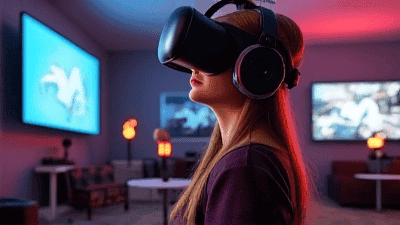
Introduction
Video games, often dismissed as mere entertainment or even a detrimental distraction, are increasingly being recognized for their profound impact on human cognition. For decades, popular culture has perpetuated a simplistic view of gaming as a leisure activity, occasionally linked to negative outcomes like social isolation or addiction. However, a growing body of scientific research is challenging this perception, revealing a complex landscape where interactive digital environments serve as potent training grounds for the brain. This shift in understanding positions video games not just as pastimes, but as sophisticated tools capable of stimulating and refining a wide array of cognitive functions, from basic sensory processing to high-level strategic thinking. The seemingly straightforward act of navigating virtual worlds, solving puzzles, or engaging in simulated combat hides intricate neural mechanisms that actively reshape and enhance our mental capabilities, leading to an in-depth discussion on how these interactive experiences translate into tangible cognitive benefits.
The background of this evolving understanding is rooted in the dramatic advancements in game design and neuroscience. As games have grown in complexity, moving from simple arcade mechanics to expansive, immersive virtual realities, so too has their potential to engage and challenge the human brain. This burgeoning field is of immense importance to the scientific community, particularly in areas like cognitive psychology, neuroscience, and educational technology, offering novel avenues for research into brain plasticity and learning. For industries ranging from professional training to healthcare, the implications are equally significant, promising innovative approaches to skill development, rehabilitation, and cognitive enhancement. Current developments highlight controversies surrounding screen time and gaming addiction, yet simultaneously underscore how game-based interventions are being explored for conditions like ADHD and dementia. What impact would it have on our understanding or practice of education, training, or rehabilitation if we failed to fully comprehend how video games boost cognitive skills? Ignoring this potential would mean overlooking a powerful, engaging, and accessible means of fostering mental agility and improving real-world performance.
Synaptic Supercharge: Gaming's Impact on Core Cognitive Functions

Precision & Processing: Enhancing Attention and Reaction Time
Fast-paced video games are not just about quick button presses; they are intense cognitive workouts that demand and refine fundamental mental faculties, particularly attention and reaction time. Selective attention, the ability to focus on relevant stimuli while ignoring distractions, is constantly exercised as players differentiate allies from enemies or identify crucial items in a visually cluttered environment. Sustained attention, the capacity to maintain focus over extended periods, is equally vital for long gaming sessions or intricate tasks within a game. Furthermore, many genres, from first-person shooters (FPS) to rhythm games, heavily rely on divided attention, requiring players to process multiple streams of information simultaneously—such as monitoring health, tracking opponent movements, and planning the next action.
The mechanism behind this enhancement involves the strengthening of neural pathways in key brain regions. The prefrontal cortex, responsible for executive functions like decision-making, and the parietal lobe, crucial for spatial attention, are highly active during gameplay. Rapid visual processing and motor responses stimulate the sensorimotor cortex and cerebellum, leading to improved hand-eye coordination and quicker reflexes. Studies have shown that expert action gamers can exhibit reaction times up to 25% faster than non-gamers, alongside superior attentional control. This constant, high-stakes demand for rapid processing effectively acts like a high-performance engine for the brain, continuously tuning and optimizing its processing speed and efficiency. The dopamine reward system also plays a crucial role, reinforcing successful actions and motivating continued engagement, which further solidifies these learned cognitive patterns.
Architects of Logic: Gaming for Strategic Thinking and Adaptability
Navigating Complexity: Boosting Planning, Memory, and Critical Analysis
Beyond immediate reflexes, many video games serve as sophisticated training grounds for higher-order cognitive functions such as problem-solving, strategic planning, and critical analysis. Complex strategy games, role-playing games (RPGs), and intricate puzzle titles demand that players set long-term goals, manage resources effectively, adapt to dynamic situations, and anticipate opponents' moves, often across vast virtual landscapes. This immersive problem-solving environment fosters a systematic approach to challenges, encouraging players to analyze information, formulate hypotheses, test solutions, and learn from outcomes.
The cognitive enhancement stems from the intense stimulation of the dorsolateral prefrontal cortex, which is critical for working memory, planning, and abstract reasoning, and the hippocampus, vital for spatial navigation and memory consolidation. Players engaging in games like StarCraft II, a real-time strategy (RTS) game, must simultaneously manage an economy, construct buildings, train units, scout enemy positions, and execute tactical maneuvers—a complex cognitive load that significantly enhances working memory and decision-making under pressure. This intricate interplay of tasks promotes "transferable skills," allowing the cognitive improvements to translate into real-world applications.
Different video game genres emphasize distinct cognitive skills, offering a diverse training ground for the brain. While fast-paced action games hone reflexes, strategic titles like Real-Time Strategy (RTS) games demand a sophisticated blend of foresight and immediate tactical execution. This table illustrates how varied gameplay experiences translate into specific cognitive enhancements:
| Game Genre | Primary Cognitive Benefits | Example Games |
|---|---|---|
| Real-Time Strategy (RTS) | Strategic planning, resource management, multitasking, decision-making under pressure | StarCraft II, Age of Empires |
| Puzzle Games | Problem-solving, pattern recognition, logical reasoning, spatial awareness | Portal, Tetris |
| Role-Playing Games (RPG) | Memory recall, narrative comprehension, moral reasoning, long-term planning | The Witcher 3, Final Fantasy |
| First-Person Shooters (FPS) | Reaction time, selective attention, spatial awareness, hand-eye coordination | Call of Duty, Overwatch |
This table illustrates how varied gameplay experiences translate into specific cognitive enhancements. For instance, RTS games, by demanding concurrent management of resources and strategic maneuvers, actively train the dorsolateral prefrontal cortex—the brain region critical for executive functions and working memory. Similarly, puzzle games, often requiring players to mentally manipulate objects or identify intricate patterns, significantly contribute to spatial reasoning and logical deduction. The diverse demands across genres ensure a holistic cognitive workout, addressing various aspects of mental agility.
Bridging Worlds: Translating Gaming Skills to Real-Life Success

From Virtual Arenas to Professional Prowess and Educational Frontiers
The cognitive enhancements cultivated through video gaming are not confined to the virtual realm; they demonstrably transfer to real-world scenarios, revolutionizing various professional and educational fields. The rapid decision-making, spatial reasoning, and multitasking abilities honed in games find direct parallels in critical occupations. For instance, surgeons who regularly play video games have been shown to perform laparoscopic (minimally invasive) procedures faster and with fewer errors, attributing their precision to enhanced hand-eye coordination and spatial awareness developed through gaming. Similarly, military personnel and pilots often utilize sophisticated flight simulators, which are essentially highly specialized video games, to hone their decision-making under pressure, multitasking capabilities, and situational awareness in high-stakes environments.
In education, the principles of 'gamification' leverage engaging game mechanics to boost student motivation and learning outcomes, turning mundane tasks into interactive challenges. This approach capitalizes on the brain's natural reward system, making learning more enjoyable and effective. The underlying mechanism for this transferability is skill generalization and neuroplasticity—the brain's ability to reorganize itself by forming new neural connections, allowing learned patterns and strategies to be applied across different contexts. Studies consistently indicate that gamers exhibit superior cognitive flexibility, a crucial attribute for adapting to dynamic professional landscapes and solving novel problems. The act of gaming, therefore, is akin to a musician practicing scales on a piano; the seemingly isolated skill development within the game forms the foundational dexterity for real-world virtuosity.
Conclusion
The journey through the intricate relationship between video games and cognitive enhancement reveals a compelling narrative: what was once largely perceived as frivolous entertainment is, in fact, a powerful catalyst for mental development. We have explored how diverse game genres actively sharpen fundamental cognitive functions, from bolstering attention and reaction times to fostering sophisticated strategic thinking, problem-solving, and critical analysis. The evidence unequivocally points to video games as dynamic training platforms that leverage the brain's inherent neuroplasticity to improve core mental abilities. By delving into the mechanisms behind these improvements—such as the strengthening of neural pathways in the prefrontal cortex and hippocampus—we underscore the theme's significant position as a legitimate and increasingly vital area of study within neuroscience, psychology, and education. Ultimately, the digital playground proves to be a robust proving ground for the mind, unlocking untapped cognitive potential.
Looking ahead, the landscape of video games and cognitive science is ripe for transformative breakthroughs. We can anticipate the development of highly personalized cognitive training games designed to target specific deficits or enhance particular strengths, potentially offering therapeutic benefits for conditions like ADHD, dyslexia, or early-stage dementia. The burgeoning field of eSports, currently valued in billions, will continue to push the boundaries of human cognitive performance, demanding further research into optimal training regimens and the psychology of competitive play. Macro scientific policies and educational reforms will likely integrate game-based learning more deeply into curricula, recognizing its potential to engage students and improve outcomes. However, challenges such as ensuring responsible screen time, mitigating the risk of gaming addiction, and designing games for holistic cognitive development remain paramount. Continuous research is essential to fully understand and harness this powerful tool, ensuring that its immense potential for human cognitive enhancement is maximized while its potential downsides are effectively managed.
Frequently Asked Questions (FAQ)

Q: Are all types of video games equally effective at boosting cognitive skills, or do certain genres offer more benefits? A: Not all video games are created equal when it comes to cognitive benefits; the effectiveness largely depends on the game's design and the specific cognitive skills it challenges. Games with high cognitive load, meaning they demand complex decision-making, strategic planning, resource management, or intricate problem-solving, tend to offer more substantial benefits. Examples include real-time strategy games like StarCraft II, complex role-playing games such as The Witcher 3, or puzzle-based titles like Portal. These games actively engage the executive functions of the brain, improving working memory, logical reasoning, and adaptability. Conversely, very simple, repetitive games that require minimal thought or skill (e.g., some idle clicker games or highly repetitive mobile titles) may offer fewer cognitive benefits, primarily stimulating basic reward pathways rather than complex neural networks. It's also important to consider how a game is played; active, engaged play that involves critical thinking will always be more beneficial than passive consumption. Therefore, to maximize cognitive gains, players should seek out games that consistently challenge their mental faculties and encourage strategic thought and problem-solving. This is analogous to physical exercise: while all movement is somewhat beneficial, targeted strength training or cardiovascular workouts yield more specific and significant health improvements than simply strolling.
Q: While focusing on benefits, what about the potential downsides of excessive gaming, such as addiction or negative health impacts? A: It's crucial to acknowledge that while video games offer significant cognitive benefits, excessive or uncontrolled gaming can lead to potential downsides, including negative health impacts and problematic use. The World Health Organization recognizes "gaming disorder" as a condition characterized by impaired control over gaming, increasing priority given to gaming over other life interests and daily activities, and continuation or escalation of gaming despite the occurrence of negative consequences. However, it's important to note that this condition affects only a small percentage of gamers, and for the vast majority, gaming is a harmless hobby. Beyond addiction, other concerns include a sedentary lifestyle, which can lead to physical health issues like obesity or musculoskeletal problems, and potential negative impacts on sleep patterns due to late-night gaming sessions or exposure to blue light. Eye strain and headaches are also common complaints. The key to maximizing the benefits while mitigating the risks lies in moderation and balance. Integrating gaming into a healthy lifestyle that includes physical activity, social interaction, sufficient sleep, and diverse hobbies is essential. Just as a balanced diet can include occasional treats, a balanced lifestyle can incorporate gaming responsibly, allowing individuals to reap the cognitive rewards without sacrificing overall well-being.








